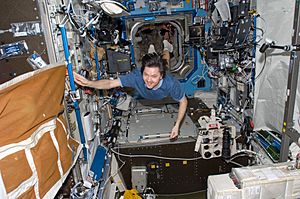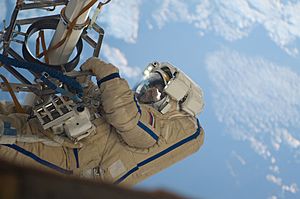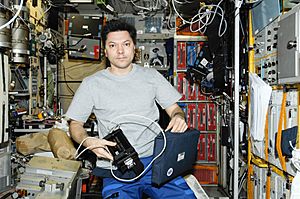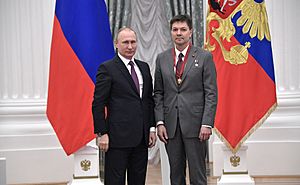Oleg Kononenko facts for kids
Quick facts for kids
Oleg Kononenko
|
|
|---|---|
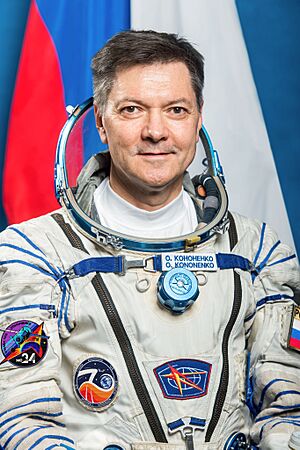
Kononenko in 2022
|
|
| Born |
Oleg Dmitriyevich Kononenko
21 June 1964 Chardzhou, Turkmen SSR, Soviet Union
|
| Status | Active |
| Nationality | Russian |
| Occupation | Engineer |
| Awards |
|
| Space career | |
| Roscosmos cosmonaut | |
|
Time in space
|
1,110 days, 14 hours, 57 minutes |
| Selection | MKS Cosmonaut Group (1996) |
|
Total EVAs
|
7 |
|
Total EVA time
|
44 hours, 30 minutes |
| Missions |
|
|
Mission insignia
|
|
Oleg Dmitriyevich Kononenko (born 21 June 1964) is a famous Russian cosmonaut. He has traveled to the International Space Station (ISS) five times. He has worked as a flight engineer and even commanded the station during some missions.
Oleg Kononenko has spent an amazing 1,111 days in space across his five long missions. On 4 February 2024, he broke the world record for the most time spent in space. The previous record was 878 days, held by Gennady Padalka. Oleg Kononenko is the first person to spend over 900, 1,000, and even 1,100 days in space!
Contents
Early Life and Education
Oleg Kononenko was born on 21 June 1964 in Türkmenabat, which was then part of the Soviet Union. He grew up in an ordinary family. His father, Dmitry Ivanovich Kononenko, was a truck driver. His mother, Taisiya Stepanovna Churakova, worked as a communications operator at the local airport. Oleg went to high school in Turkmenabat and was very good at the Turkmen language.
Becoming an Engineer
After high school, Oleg first tried to get into the Kharkiv Aviation Institute but didn't succeed. He went back home and worked for a year at the Türkmenabat Airport. He tried again and was accepted! In 1988, he graduated from the N. E. Zhukovskiy Kharkiv Aviation Institute as a mechanical engineer.
Space Career
After finishing college, Kononenko started working at a Russian space company called TsSKB-Progress in Kuybishev. He began as an engineer and moved up to become a leading design engineer. He helped design and develop electrical power systems for spacecraft.
On 29 March 1996, Oleg was chosen to become a cosmonaut. He trained at the Gagarin Cosmonaut Training Center for almost two years. In March 1998, he officially became a test cosmonaut. Later that year, he began training specifically for the International Space Station (ISS) program.
First Mission: Expedition 17
Oleg Kononenko's first space mission was Expedition 17. He launched to the ISS on 8 April 2008 aboard the Soyuz TMA-12 spacecraft. He worked as a flight engineer. He spent 199 days in space during this mission.
Spacewalks
Kononenko performed his first spacewalk on 10 July 2008. He and fellow cosmonaut Sergey Volkov went outside the ISS from the Pirs docking compartment. They checked their Soyuz spacecraft and retrieved a part from it. This spacewalk lasted 6 hours and 18 minutes.
Just five days later, on 15 July 2008, Kononenko did his second spacewalk. Again with Sergey Volkov, they installed new experiments and retrieved others. They also added more equipment to the outside of the station. This spacewalk lasted 5 hours and 54 minutes.
Kononenko returned to Earth on 24 October 2008, landing in Kazakhstan.
Second Mission: Expedition 30/31
On 21 December 2011, Kononenko launched to the ISS again with André Kuipers and Donald Pettit. They joined the crew of Expedition 30.
On 12 February 2012, Kononenko and Anton Shkaplerov performed another spacewalk. They installed shields on the Zvezda Service Module to protect it from small space debris. They also moved a crane and installed parts on a ladder used by spacewalkers. They returned to Earth on 1 July 2012.
Third Mission: Expedition 44/45
Oleg Kononenko's third trip to space began on 22 July 2015. He was the commander of the Soyuz TMA-17M spacecraft. He flew with NASA astronaut Kjell Lindgren and Kimiya Yui from Japan. They spent five months on the ISS as part of Expedition 44 and Expedition 45. They landed safely in Kazakhstan on 11 December 2015. Kononenko spent 142 days in space on this mission.
Fourth Mission: Expedition 57/58/59
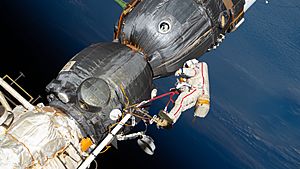
Kononenko launched for his fourth mission on 3 December 2018, commanding Soyuz MS-11. He was a flight engineer for Expedition 57 and later commanded both Expedition 58 and Expedition 59. He returned to Earth on 24 June 2019, after spending 203 days in space.
During this mission, on 31 December 2018, Kononenko showed the flag of Turkmenistan and a book from the ISS. He wished everyone in Turkmenistan a Happy New Year from orbit. He shared his special feelings for the country where he was born and grew up.
Fifth Mission: Expedition 69/70/71
In September 2023, Kononenko launched on his fifth mission aboard Soyuz MS-24. He was assigned to a year-long mission with his Russian crewmate Nikolai Chub. This mission started on September 15, 2023. By the time he returned to Earth on Soyuz MS-25, Kononenko had spent a total of 1,111 days in space.
On 4 February 2024, he officially broke the world record for the most time spent in space. He continued to set new records, becoming the first person to spend over 900, 1,000, and 1,100 days in space.
Personal Life
Oleg Kononenko was a talented volleyball player in school and was part of Turkmenistan's youth team. He is married to Tatyana Mikhailovna Kononenko. They have a son named Andrey and a daughter named Alisa. Oleg enjoys reading and playing team sports. In 2015, he was elected to a public office in Korolyov, Russia.
Honors and Awards
Oleg Kononenko has received many important awards for his work as a cosmonaut:
- Hero of the Russian Federation (2009) - for his bravery and heroism in space.
- Hero of Turkmenistan (2019)
- Medal "For Merit in Space Exploration" (2011) - for his great achievements in exploring space.
- Star of President Order (Turkmenistan, 2009) - for his service and professionalism in space exploration.
- Pilot-Cosmonaut of the Russian Federation (2009)
- Gagarin Medal
- Honorary Citizen of Gagarin, Smolensk Oblast (2011)
- NASA Distinguished Public Service Medal (USA, 2008)
- NASA Space Flight Medal (USA, 2008)
See also
 In Spanish: Oleg Kononenko para niños
In Spanish: Oleg Kononenko para niños
 | William Lucy |
 | Charles Hayes |
 | Cleveland Robinson |


